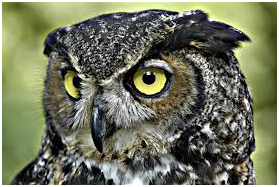Of the Owl and the Koel
Stories for children

The many books about bees and birds written by Raza and Arefa Tehsin, a father-daughter duo are a must for all children destined to spend the rest of their lives away from the mysteries of nature.
For to read the Tehsins is to discover delightful details like this one about the koel or nightingale from Do Tigers Drink Blood? And 13 Other Mysteries of Nature, that enlighten not just children, but will also thrill adults.
The authors say that the beauteous bird gets its name from the Sanskrit word kokila, also related to black like coal or koyala.
The koel finds important mention in literature, poetry, myths, tribal lore and traditions since times long forgotten because its song heralds new beginnings in a new year. The near veneration of the bird and its singing evokes warm feelings of the end of winter and of an almost overnight burst of spring. The trembling notes of the koel always come accompanied with the sweet fragrance of mango flowers.
The other details about the koel include its resemblance to the crow although the koel is a little smaller and thinner but with a longer tail. And the sweet voice that the koel is so loved for is that of the male bird.
The mention of crows brings us to a nasty trait of the koel. It is a brood parasite! The Vedas, written thousands of years ago, refer to koels as anya-vapa meaning 'one raised by others'. By others we mean mostly crows and sometimes birds like mynas. The musical bird, so highly respected, has a mean habit. It never builds its own nest and sneaks into the nest of the crow or some other bird to lay its eggs. Sometimes, during the koel's mating season, which is almost at the same time as the crow's you might come across a female koel and a female crow pushing and shoving each other in a fight. This is when the female koel tries to sneak into the crow's nest to lay its eggs. If it's spotted by the female crow, it tries to push the intruder away.
The Tehsins know all this and much more because they come from a family of naturalists. Today Raza is a household name in southern Rajasthan where he was the first to flag off a wildlife conservation movement. Son of renowned shikari TH Tehsin, Raza grew up in the lap of the jungle and in the company of animals. His father was once a big game hunter and enjoyed a monopoly in the arms and ammunition business in Mewar.
It was the father's passion for hunting that got Raza fascinated with the forests. His father eventually turned conservationist, bringing the family very close to Nature and to an abiding interest in indigenous herbs and medicines. It is almost four decades since Raza has been treating people for leucoderma, the cosmetic skin disorder with local herbs mingled into medicine.
Known as the Vasco de Gama of Udaipur jungles, Raza has walked around the southern Rajasthan forests for years and knows it perhaps better than the back of his hand. While taking care of the family’s extensive mining operations in the hills and valleys around Udaipur, he has lived by himself in the jungles of the Aravali hills for long.
As he watched the destruction of forests and wildlife by human settlements and poachers, he began a life long crusade for wildlife protection and conservation and went on to establish game sanctuaries like Phulwari-Ki-Nal, Sitamata and Sajjangarh.
Raza's love for nature is inherited by daughter Arefa, also the honorary wildlife warden in Udaipur. For Arefa the wilderness holds endless magic. Arefa has experienced real life magic in the forests where she has played in streams, smelt flowers, eaten wild fruits, yelped at being stung by a bee, held twinkling fireflies in the hand and had waterfalls quench her thirst.
No wonder this writer, self confessed junglee, rebel and sleepless dreamer is able to weave such tall tales from the deep of a forest.
The other book that I have in hand by Raza and Arefa is a collection of eight stories called The Land of the Setting Sun and Other Nature Tales that is published by The Energy and Resources Institute (TERI).
Here readers are introduced to a scorpion and to Ayan who sets out to solve six riddles in search of his dead father's treasure. Then there is Madhu who wants to revenge the class bully at the cost of sacrificing a horned owl. Scarab is the dung beetle whose existence is threatened by the jungle itself as he tries to escape a murderous mob and to find the land of the setting sun.
The Best Kept Secret is about Gloaty discovering something shocking about Pan, the god of the mountain wilds and perhaps also the most thrilling read of the pack.



